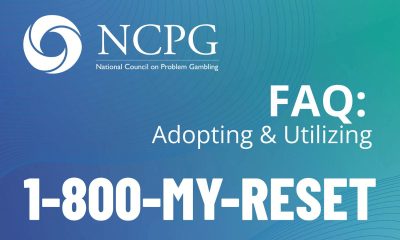Industry News
European Lotteries Adapting to a Post-corona World

The lottery executives and industry experts in Europe have met together via an online webinar “Lotteries in COVID-19 Lockdown” to discuss the impact of COVID-19 on the lottery sector, the consequences for a post-corona world and the importance of continuing to fund good causes during a pandemic.
The webinar was organised by VIXIO GamblingCompliance in association with The European Lotteries (EL), together with representatives of two of EL Members the SAZKA Group and Veikkaus Oy. The webinar has gathered over 250 participants.
During the webinar, EL Secretary General Arjan van ‘t Veer outlined the situation for lotteries during the lockdown. In their immediate response to the outbreak, the vast majority of EL Members have already taken a series of priority actions to protect players and lottery employees, retailers and providers’ staff. The most common steps included remote working, travel restrictions and regular communication with the players and relevant stakeholders.
On the operational side, Mr. van ‘t Veer noted: ‘‘I have seen many EL Members take necessary continuity measure to make sure operations can continue. In the first days of the lockdown, there was a tremendous drop in sales, as retailers closed their doors and draws were postponed or cancelled. Early on, Members that operate slot machines, EGMs or casinos took their responsibility to close, in order to reduce large public gatherings. As the lockdown spread across Europe, more POSs were closed (some up to 100%) and sports betting took a major hit.’’
However, it is not all bad news. Mr. van ‘t Veer added, ‘‘Over the last few weeks some EL members have reported stable sales. Online games are performing better than expected, scratch cards are doing well, and many lottery campaigns are now focused on good causes to support the health sector and vulnerable people, such as funding for medical equipment or the delivery of daily essential supplies to care homes. Since the Easter break, there has been a positive impact on the sales of (draw based) games. There is still a long way to go but light is at the end of the tunnel. Some POSs are re-opening and Members are reporting preparations to get back to (full) business when possible.’’
Moderated by Andrew Gellatly, Head of Global Research at VIXIO, the discussions moved on to national situations and how lotteries can learn to co-exist with the virus.
Robert Chvatal, CEO of the Sazka a.s. and Sazka Group highlighted the observed “north-south divide,” i.e. differences in impact on lottery business between southern and northern regions of Europe, where for example in the southern countries with very small share of on-line lottery sales and 100% POS closures, the business was hit very hard by the crisis and in opposite, in the northern and central European countries, where the on-line share is much higher and retail was closed only partly, the business impact was much smaller.
“Many lotteries have seen a significant increase in online sales share, due to the retail channel limitations and customers’ willingness to have a chance to continue to play. Fortunately, this is even supported by high jackpots of both, local Lotto games and Eurojackpot/ Euromillions, attracting even occasional players to participate. This is something that lotteries will need to adjust to support, for example, their elderly customers concerned about going to their usual retailer with advice on how to play online. Some of them will probably remain the online customers, benefiting from convenience of on-line channel, which will partially increase the future on-line channel share. Nevertheless, plenty of the players will revert back to play in retail, especially those needing the social contact connected with the play. I believe that the lotteries biggest challenge will be to re-open fully the retail channel, respecting all hygienic rules to protect both customers and retailers, and ramp-up the retail channel performance as soon as possible to start to generate good causes contributions on the pre-corona level,” Chvatal noted.
On monitoring changes in the behaviour of players, Sami Kauhanen, SVP of Betting at Veikkaus Oy highlighted that “in Finland casinos, VLTs and slot machines closed in March, while the retails network remained open and continued to operate more or less ‘normally.’ There has been a slight increase for online casinos, but not to the extent that they are seen as a replace to suspended games such as slot machines. On offshore operators, there are not major changes during the lockdown. There is a traditional loss of the market share for online casinos and betting from these operators, regardless of the crisis.”
On sports betting Mr. Kauhanen added, “Live sport betting is a big thing in our country and with the cancellation of sport events, many are turning towards betting on horse-racing, often with new players who cannot currently bet on their favourite live sport, like football. Virtual betting and e-sports are not so popular in Finland.”
An audience poll was conducted during the webinar on what changes there will be in lottery player behaviour in the post-corona era. Most participants said players would revert to their existing retail/online preferences, followed closely by players staying online and retail lotteries becoming less relevant.
Source:
Powered by WPeMatico
ICE 2026
Win Systems Showcases Gaming Innovations at ICE Barcelona 2026

Win Systems, a leading provider of technology for the gaming and entertainment industry, participated in ICE 2026, held in Barcelona from January 19 to 21. In this context, the company strengthened its positioning in the Spanish market, with a special focus on route operations as one of the strategic pillars of its technological offering.
In a market such as Spain, characterised by its own regulatory framework and highly specific operational requirements, Win Systems continues to develop solutions designed to help operators differentiate themselves and maximise the performance of their operations. In this regard, WIGOS ONE has established itself as a comprehensive and modular management platform, capable of adapting to different business models—including gaming halls, bingos, casinos, hospitality venues and route operations—and integrating with third-party systems, ensuring flexibility and regulatory compliance.
During ICE 2026, Win Systems placed special emphasis on two of its main differentiators for the Spanish market: Player Tracking and Win Pay. The Player Tracking solution enables operators to gain in-depth insight into player behavior and enhance loyalty through advanced tools such as jackpots and Happy Hour promotions, improving gaming experience and player engagement.
Meanwhile, Win Pay was presented as a strategic lever for the digitalization of payments in route operations and other environments, highlighting the new eTITO solution for kiosk payments without the need for paper tickets. This solution delivers a faster and more convenient payment experience for players, while providing operators with greater control and operational efficiency.
José Luis González, Sales Director for Spain at Win Systems, stated: “ICE 2026 has been a key opportunity to showcase how our solutions help Spanish operators stand out. With tools such as Player Tracking and Win Pay, we deliver real value in the areas that enable operators to compete more effectively, build player loyalty, and optimize operations in a market as specific as Spain.”
The post Win Systems Showcases Gaming Innovations at ICE Barcelona 2026 appeared first on Eastern European Gaming | Global iGaming & Tech Intelligence Hub.
BetConstruct AI
BetConstruct AI’s Harmony ChoiceMe: Redefining Success in the Middle East

BetConstruct AI proudly introduces Harmony ChoiceMe, a unique, high-level event aimed at nurturing strategic relationships and examining fresh opportunities within the changing environment of the Middle East.
Scheduled for 8 February 2026 in the lively center of Dubai, the event will unite the industry’s most prominent thinkers for an exclusive evening of cooperation and understanding. Hosted on the opulent Lotus Royale Cruise, the gathering provides an elegant and exclusive setting for significant discussions just 48 hours prior to the industry’s gathering for AIBC Eurasia.
Harmony ChoiceMe operates on the belief that achieving success in the area starts with making the right connections and optimal choices. With the industry seeking growth and innovation in the Middle East, this event offers an essential opportunity for reflection and premium networking, enabling partners and peers to synchronize their strategies in a sophisticated and motivating environment.
The evening aims to enable a smooth shift from innovative concepts to practical collaborations, making sure participants head into the forthcoming hectic summit with clear understanding and an enhanced network.
Interested parties are invited to reserve their place for an evening here.
The post BetConstruct AI’s Harmony ChoiceMe: Redefining Success in the Middle East appeared first on Eastern European Gaming | Global iGaming & Tech Intelligence Hub.
FA CHAI Card
FA CHAI Gaming Introduces Player Achievement System

FA CHAI Gaming has introduced its Player Achievement System, a long-term progression framework designed for online casino platforms and operator partners to drive sustained engagement, repeat play and deeper player connection.
The system moves beyond short-lived promotions by transforming everyday gameplay into structured objectives, visible progress and meaningful milestones. At the centre of this approach is the FA CHAI Card, a cross-game reward mechanism that allows player achievements to extend beyond a single game and into a broader FA CHAI Gaming ecosystem.
The Player Achievement System is more than an add-on feature—it functions as a behavioural engine designed to improve the KPIs that matter most to operators. By combining achievement-based goals, missions and progression rewards, platforms can cultivate stronger player habits and longer lifecycle value.
Sustainable retention: visible progress and long-term objectives encourage players to return consistently.
More stable engagement: achievement-driven tasks support regular activity across sessions and weeks.
Healthier wagering patterns: cumulative goals motivate play naturally, without excessive bonus dependency.
Deeper player attachment: achievements turn gameplay into a personal journey rather than isolated actions.
Stronger ecosystem loyalty: cross-game rewards reinforce attachment to the broader FA CHAI Gaming portfolio.
Many engagement tools in the market rely on short-term incentives that generate brief activity spikes followed by rapid decline. The Player Achievement System focuses instead on the drivers of repeat behavior: clarity, continuity and purpose.
Progress over promotion: players work towards ongoing achievements rather than reacting to one-time offers.
Lower friction, higher satisfaction: rewards are earned through play, reducing frustration and drop-off.
Built-in freshness: evolving goals and rotating missions help prevent engagement fatigue.
Operational efficiency: structured progression reduces the need for constant campaign rebuilding.
Designed to scale: the framework can evolve alongside platform strategy and player growth.
The Player Achievement System is designed to adapt across FA CHAI Gaming’s supported games, with initial implementation focused on slot-style gameplay. The underlying logic remains intentionally flexible, allowing future expansion into additional game experiences without restructuring the system foundation.
Player actions contribute to visible achievement progress through daily and weekly missions, turning routine gameplay into measurable advancement. As objectives are completed, players unlock new achievement tiers and long-term progression paths, creating a clear sense of growth over time.
A core pillar of the Player Achievement System is the FA CHAI Card. Serving as a cross-game reward mechanism, FA CHAI Cards allow players to convert achievements earned in one game into free game opportunities across other FA CHAI Gaming games.
This design encourages players to explore a wider range of games, experience different mechanics and creative themes and gradually become more deeply integrated into the FA CHAI Gaming ecosystem. Rather than isolating rewards within individual games, FA CHAI Cards connect progress across games, supporting long-term player journeys and cross-game engagement.
By extending progression beyond a single product, FA CHAI Cards help operators increase portfolio exposure while offering players a more cohesive and rewarding platform experience.
Optional competitive elements, such as rankings or achievement-based leaderboards, can be integrated into the system to motivate highly engaged players further. These features act as enhancers rather than requirements, preserving balance while offering additional incentives.
The post FA CHAI Gaming Introduces Player Achievement System appeared first on Eastern European Gaming | Global iGaming & Tech Intelligence Hub.
-

 Amusnet7 days ago
Amusnet7 days agoWeek 5/2026 slot games releases
-

 Compliance Updates7 days ago
Compliance Updates7 days agoNational Council on Problem Gambling Adopts 1-800-MY-RESET as New National Problem Gambling Helpline Number
-

 Ani Isakhanyan7 days ago
Ani Isakhanyan7 days agoFeedConstruct Expands its Presence in Latin America
-

 FDJ UNITED7 days ago
FDJ UNITED7 days agoFDJ UNITED Aims to be Among the Top Three Licensed Gambling Operators in Finland
-

 Compliance Updates7 days ago
Compliance Updates7 days agoDigitain Secures Isle of Man iGaming Software Supplier Licence
-

 betting terminals6 days ago
betting terminals6 days agoMeridianbet Completes Fairbet Acquisition, Expanding Malta Retail Gaming Network Under Golden Matrix Group
-

 Carl Gatt Baldacchino Head of Account Management SlotMatrix7 days ago
Carl Gatt Baldacchino Head of Account Management SlotMatrix7 days agoSlotMatrix Unleashes Fiesta-Fueled Thrills with Muertos Fortune
-

 Book of Sobek4 days ago
Book of Sobek4 days agoHölle Games Releases Book of Sobek



















